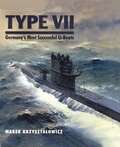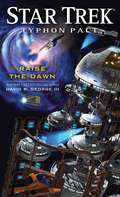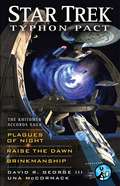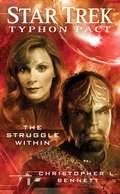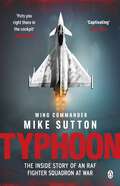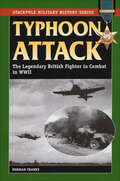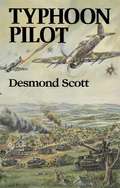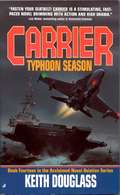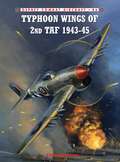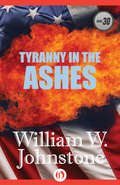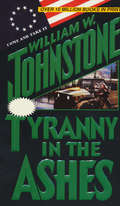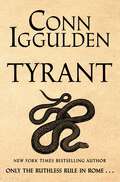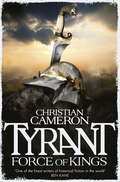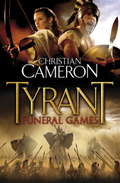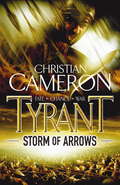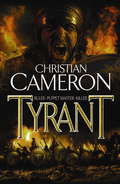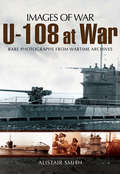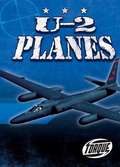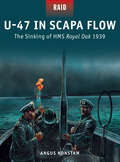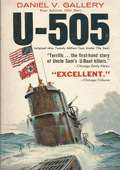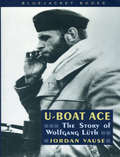- Table View
- List View
Type VII: Germany's Most Successful U-Boats
by Marek Krzysztalowicz&“Describ[es] the Type VII and its place in the history of warfare . . . probably the finest book on German submarines of WWII available in print.&”—Firetrench First conceived in the mid–1930s, the Type VII was still in production in the closing stages of the Second World War a decade later. Subject to continuous improvement through six major variants and with around 650 completed, it was built in larger numbers than any other submarine design in history. It formed the backbone of the Kriegsmarine&’s campaign against merchant shipping for the whole of the war, and in terms of tonnage sunk was by far the most successful U-boat type. This encyclopedic work combines a technical description of the type in all its variations with a history of its development and an overview of its most significant operations—especially those convoy battles that were to have a crucial impact on the evolution of the design and its equipment. A particular attraction of the book is the comprehensive visual coverage—photographs of virtually every aspect of design, construction, fittings and shipboard life; highly detailed general arrangement plans and close-up scale drawings; and, with modelmakers in mind, a stunning collection of full-color three-dimensional illustrations of every external feature and variant of the boats. There have been many books on U-boats reflecting an enduring public interest so any new offering has to be special. With its unique concentration of information and illustrative reference, Type VII is unrivalled. &“A comprehensive history of the Kriegsmarine&’s most potent weapon . . . includes detailed modelmakers&’ plans together with over 320 photographs.&”—Maritime Advisor
Typhon Pact: Raise the Dawn (Star Trek- Typhon Pact Book 7) (Star Trek)
by David R. George IIIThe second novel in a two-part Typhon Pact adventure set in the universe of Star Trek: The Next Generation. After the disastrous events in the Bajoran system, Captain Benjamin Sisko must confront the consequences of the recent choices he has made in his life. At the same time, the United Federation of Planets and its Khitomer Accords allies have come to the brink of war with the Typhon Pact. While factions within the Pact unsuccessfully used the recent gestures of goodwill—the opening of borders and a joint Federation-Romulan exploratory mission—to develop quantum-slipstream drive, they have not given up their goals. Employing a broad range of assets, from Romulus to Cardassia, from Ab-Tzenketh to Bajor, they embark on a dangerous new plan to acquire the technology they need to take control of the Alpha and Beta Quadrants. While UFP President Bacco and Romulan Praetor Kamemor work feverishly to reestablish peace, Captains Sisko, Jean-Luc Picard, and Ro Laren stand on the front lines of the conflict...even as a new danger threatens the Bajoran wormhole as it once more becomes a flashpoint of galactic history.
Typhon Pact: The Khitomer Accords Saga
by David R. George III Una McCormackThree thrilling novels set in the universe of Star Trek: The Next Generation!Plagues of Night In the wake of the final Borg invasion, which destroyed entire worlds, cost the lives of sixty-three billion people, and struck a crippling blow to Starfleet, six nations adversarial to the United Federation of Planets—the Romulan Star Empire, the Breen Confederacy, the Tholian Assembly, the Gorn Hegemony, the Tzenkethi Coalition, and the Holy Order of the Kinshaya—joined ranks to form the Typhon Pact. For almost three years, the Federation and the Klingon Empire, allied under the Khitomer Accords, have contended with the nascent coalition on a predominantly cold-war footing. But as Starfleet rebuilds itself, factions within the Typhon Pact grow restive, concerned about their own inability to develop a quantum slipstream drive to match that of the Federation. Will leaders such as UFP President Bacco and RSE Praetor Kamemor bring about a lasting peace across the Alpha and Beta Quadrants, or will the cold war between the two alliances deepen, and perhaps even lead to an all-out shooting war? Raise the Dawn After the disastrous events in the Bajoran system, Captain Benjamin Sisko must confront the consequences of the recent choices he has made in his life. At the same time, the United Federation of Planets and its Khitomer Accords allies have come to the brink of war with the Typhon Pact. While factions within the Pact unsuccessfully used the recent gestures of goodwill—the opening of borders and a joint Federation-Romulan exploratory mission—to develop quantum-slipstream drive, they have not given up their goals. Employing a broad range of assets, from Romulus to Cardassia, from Ab-Tzenketh to Bajor, they embark on a dangerous new plan to acquire the technology they need to take control of the Alpha and Beta Quadrants. While UFP President Bacco and Romulan Praetor Kamemor work feverishly to reestablish peace, Captains Sisko, Jean-Luc Picard, and Ro Laren stand on the front lines of the conflict...even as a new danger threatens the Bajoran wormhole as it once more becomes a flashpoint of galactic history. Brinkmanship The Venette Convention has always remained independent, but it is about to become the flashpoint for a tense military standoff between the two power blocs now dominating interstellar space—the United Federation of Planets and the recently formed Typhon Pact. The Venetan government turns to the Typhon Pact’s Tzenkethi Coalition for protection in the new order, and has agreed to allow three of their supply bases for Tzenkethi use. But these bases—if militarized—would put Tzenkethi weapons unacceptably close to Federation, Cardassian, and Ferengi space. While Captain Ezri Dax and the crew of the U.S.S. Aventine are sent to investigate exactly what is happening at one of the Venette bases, Captain Jean-Luc Picard and the U.S.S. Enterprise are assigned to a diplomatic mission sent to the Venette homeworld in order to broker a mutually acceptable resolution. But the Cardassian delegates don’t seem particularly keen on using diplomacy to resolve the situation, which soon spirals out of control toward all-out war. . .
Typhon Pact: The Struggle Within (Star Trek)
by Christopher L. BennettAn original eBook novella set in the acclaimed Typhon Pact series! An original e-novella in the acclaimed Typhon Pact series! The Enterprise-E is on a diplomatic mission to the Talarian Republic, the last holdout in the Federation’s efforts to expand the Khitomer Accords in response to the emergence of the Typhon Pact. In the wake of Andor’s recent secession, the Federation is more concerned than ever with strengthening its alliances. The Talarians have been a tenuous potential partner at best, given the history of conflict and mistrust between them and the Federation. But the negotiations between Picard and the Talarians are disrupted by a growing public protest of those who are demanding greater rights—and before long, it becomes clear that the dissidents are not limiting themselves to nonviolent means….
Typhoon
by Mike SuttonThe thrilling account of the Typhoon FGR4s in the war against ISIS, from the RAF Wing Commander who led them into combat'Adrenaline-fuelled. A rare insight into the high-pressure, high-stakes world of an RAF fighter squadron at war' JOHN NICHOL________'Dragon, we've got reports of a mortar firing team to the west of Mosul. We need you to redeploy now . . .'Mike Sutton commanded the RAF's top Typhoon squadron across Iraq and Syria in the war against ISIS. Flying a Eurofighter Typhoon FGR4, the most advanced multi-role combat aircraft in the world, across treacherous skies, he was dodging ground fire, anti-aircraft artillery, and surface-to-air missiles.Split-second decisions and actions made the difference between life and death in the air - and on the ground . . .Typhoon tells the dramatic story of an air-combat squadron in action, putting you in the cockpit, hands gripping the controls, the sounds of battle crackling in your ears.Buckle up!________'A fabulous insight into the mind of an accomplished fighter pilot and leader as he takes on the biggest challenge of his career' FLYER'Gripping, nerve-shredding, captivating, visceral, fascinating' DAILY MAIL
Typhoon Attack: The Legendary British Fighter in Combat in WWII (Stackpole Military History Series)
by Norman FranksThis volume collects lively tales of aerial combat from Royal Air Force pilots who flew Typhoon fighters into the frontlines of WWII. The Typhoon fighter played a pivotal role in Allied victories from D-Day to the Battle of the Bulge and the final battle in Germany. Through original interviews with RAF veterans, Norman Franks explores what it was really like to fly Britain&’s legendary, rocket-firing fighters. Typhoon Attack shares stories of flying over Holland or France at low level, seeking out hostile aircraft or targets on the ground; rolling over at twelve-thousand feet, then upside down; attacking trains, ships, flak posts, tanks, and more; not to mention the mind-numbing experience of crash-landing a shot-up Tiffy.
Typhoon Pilot
by Desmond ScottA decorated WWII flying ace and Royal Air Force Group Captain recounts his experience in the air over Europe in this thrilling military memoir. New Zealand fighter pilot Desmond Scott joined the Royal Air Force in 1940. Over the course of his illustrious service, he was awarded the Distinguished Flying Cross and Bar, and a Distinguished Service Order. For the heroic act of rescuing a pilot from a crashed Supermarine Spitfire, he was made an Officer of the Order of the British Empire. In Typhoon Pilot, Scott recounts his time as a young commander of a New Zealand Air Force squadron, and later as the RAF's youngest Group Captain at the age of 25. His story includes conflict in the air over Normandy, Belgium, Holland and Germany, where the Hawker Typhoon fighter-bomber fought its last battle.
Typhoon Season (Carrier #14)
by Keith DouglassWhen an American yacht is attacked in international waters by a Chinese combat helicopter, tensions flare. China staunchly denies they had anything to do with the incident, and Carrier Battle Group Fourteen is put on full alert for what may become a full-blown shooting war between the superpowers...and that is when the real enemy strikes!
Typhoon Wings of 2nd TAF 1943-45
by Chris ThomasThe Typhoon was the RAF's chosen heavyweight fighter-bomber to support the British and Canadian Armies during the invasion of northwest Europe in World War II (1939-1945). A specialist in the aircraft (his father flew them in WWII), author Chris Thomas has done much research on the Typhoon's operations with 2nd TAF during this crucial period of the war. His research reveals for the first time the extent, and chronology, of the struggle to equip 18 RAF and RCAF squadrons in time for D-Day, and how this feat was only narrowly achieved. These 18 squadrons (later increased to 20) were organised into highly mobile, self-supporting wings that provided devastating close support for the British and Canadian armies in their advance across northwest Europe. Thomas' book analyzes the tactics employed by the Typhoon squadrons during these epic events, supported by the words of the pilots themselves. These battles were by no means one-sided, with the Typhoons' nemesis - the highly effective German flak units - exacting a terrible toll on 2nd TAF units. Indeed, some 400 aircraft and 150 pilots were lost during the Normandy campaign alone. Losses such as these led Air Chief Marshal Sir Harry Broadhurst, Air Officer Commanding 83 Group (which controlled more than half of 2nd TAF's Typhoon squadrons), to remark 'I suppose that flying one of these aircraft was the most dangerous task the Air Force has ever asked anybody to do'. Along with photographs and diagrams, the book includes artwork by the author as well, making for a comprehensive and authoritative guide.
Tyranny In the Ashes (Ashes #30)
by William W. JohnstoneThe patriot army of Ben Raines went toe-to-toe with the most powerful enemy in the world-the USA- and fought its way through hellish chaos and terrorism. But for the free and the brave there is no rest-not when USA leader Claire Osterman has been ousted from power. Her reaction: A plan for revenge that will plunge the North American continent into bloody war. The attack will come from the South, where Osterman has made a pact with the devil-a former Sandinista Rebel named Perro Loco. Ruching up through Costa Rica and Mexico, their unholy alliance is poised to strike at the heart of the SUSA. Ben Raines, however, will not wait until blood is spilled on his soil. He will lead his own strike force into the jungles of Mexico... to kill the enemy on his own ground
Tyranny in the Ashes (Ashes #31)
by William W. JohnstoneIn post-apocalyptic, dystopian North America, an ex-mercenary leads forces against an evil brewing in Mexico—from a USA Today–bestselling author. The patriot army of Ben Raines went toe-to-toe with the most powerful enemy in the world—the USA—and fought its way through the hellish chaos and terrorism. But for the free and the brave there is no rest—not when USA leader Claire Osterman has been ousted from power. Her reaction: a plan for revenge that will plunge the North American continent into bloody war. The attack will come from the South, where Osterman has made a pact with the devil—a former Sandinista Rebel named Perro Loco. Rushing up through Costa Rica and Mexico, their unholy alliance is poised to strike at the heart of the SUSA. Ben Raines, however, will not wait until blood is spilled on his own soil. He will lead his own strike force into the jungles of Mexico...to kill the enemy on his own ground. Thirtieth in the long-running series!
Tyrant: A Novel (The Nero Trilogy)
by Conn IgguldenFrom New York Times bestselling author Conn Iggulden, the second novel in this new trilogy finds newly-crowned Emperor Nero fending off court rivals while embracing his fate as the most feared, notorious ruler in Roman history.Ancient Rome, 50 AD. Agrippina secures her son Lucius&’s fate through her marriage to Emperor Claudius. Though more intelligent than her previous husbands—and with a power that is absolute—for a time she bends her husband to her will. Claudius is gentle as a lamb with a rope around its neck. So it is that Lucius is adopted into the imperial family and becomes Nero Claudius Caesar Augustus Germanicus. But this is merely the first of many moves in the game of power. As mother and son risk everything—their alliances and betrayals, their cruelties and crimes, their brilliance and their ambition—this vivid tapestry is brought brilliantly to life by Conn Iggulden in Tyrant.
Tyrant: Force Of Kings (Tyrant Ser.)
by Christian CameronTwin monarchs Satyrus and Melitta have worked hard, seen much blood shed and many good friends die to secure their fertile kingdom on the Black Sea. But as the colossal conflict between Alexander the Great's former generals to inherit his empire rages from one end of the known world to the other, sitting on the sidelines is not an option. If their kingdom is to have a future, Satyrus and Melitta must join forces with one of the contenders, knowing that making the wrong choice could mean disaster. And with Ptolemy, Antigonus One-Eye and his son Demetrius 'the Besieger', Lysimachus and Seleucus all massing their forces for one last battle, the stakes could not be higher. But with the wily Athenian schemer Stratokles, the courtesan-spy Phiale and Satyrus' lover, the power-hungry Briseis, daughter of the Tyrant of Syracuse, also determined to secure the spoils of victory for themselves, the twins find themselves caught in a deadly web of intrigue that could cost them everything.
Tyrant: Funeral Games (Tyrant Ser. #3)
by Christian CameronAn action-packed tale of betrayal and revenge set amid the war between Alexander the Great's generals and climaxing in the most spectacular battle of the ancient world.Satyrus and Melitta, twin heirs to a rich kingdom on the Black Sea, become desperate fugitives when their mother, the Scythian warrior-princess Srayanka, is cut down in a savage act of betrayal. Accompanied by their tutor, the Spartan Philokles, they must make a perilous journey west, pursued by ruthless assassins, to find sanctuary with the army of their father's closest friend, Diodorus. But Diodorus is caught up in the tangled web of alliances, betrayals and intrigue that followed Alexander the Great's death, as his generals fought over the huge empire he had created - and soon the twins will have their first taste of real battle as two Macedonian warlords clash. In this violent and unstable world, they must choose sides carefully, as Antigonus One-Eye, and his brilliant son Demetrius, prepare to take on the might of Ptolemy's Egypt, and the forces gather for the biggest and most spectacular battle the world had ever seen - Gaza.
Tyrant: Funeral Games (Tyrant)
by Christian CameronAn action-packed tale of betrayal and revenge set amid the war between Alexander the Great's generals and climaxing in the most spectacular battle of the ancient world.Satyrus and Melitta, twin heirs to a rich kingdom on the Black Sea, become desperate fugitives when their mother, the Scythian warrior-princess Srayanka, is cut down in a savage act of betrayal. Accompanied by their tutor, the Spartan Philokles, they must make a perilous journey west, pursued by ruthless assassins, to find sanctuary with the army of their father's closest friend, Diodorus. But Diodorus is caught up in the tangled web of alliances, betrayals and intrigue that followed Alexander the Great's death, as his generals fought over the huge empire he had created - and soon the twins will have their first taste of real battle as two Macedonian warlords clash. In this violent and unstable world, they must choose sides carefully, as Antigonus One-Eye, and his brilliant son Demetrius, prepare to take on the might of Ptolemy's Egypt, and the forces gather for the biggest and most spectacular battle the world had ever seen - Gaza.
Tyrant: Storm Of Arrows (Tyrant Ser. #2)
by Christian CameronThe stunning sequel to Christian Cameron's epic TYRANT.Kineas, the Athenian cavalry commander, has come a long way since being dismissed from the army of Alexander and vengefully exiled by his own city. Together, his mercenary force and their Scythian allies have defeated a mighty Macedonian army at the Ford of the River God, and his adopted city of Olbia is now free once more. But his destiny will not allow him to enjoy the fruits of victory for long. Far to the east, at the farthest edge of the Sea of Grass, Alexander is threatening to crush the Scythian hordes once and for all. The Lady Srayanka of the Cruel Hands, the Scythian warrior-princess who spurned a king's love to be at Kineas's side, is pledged to take her tribe east to help stop 'the monster' - and Kineas knows he has no choice but to follow, even if it means embracing the violent death in battle that he has seen prefigured in countless dreams. But long before he can confront the might of Alexander's army alongside his beloved Srayanka, he must undertake an epic journey of breathtaking daring...
Tyrant: Storm Of Arrows (Tyrant Ser.)
by Christian CameronRuler. Puppet Master. Killer.Glory. Death. Well-born Athenian cavalry officer, Kineas, fought shoulder to shoulder with Alexander in his epic battles against the Persian hordes. But on his return from the east to his native city, he finds not glory but shame - and exile.With nothing to his name but his military skills, Kineas agrees to lead a band of veterans to the city of Olbia, where the Tyrant is offering good money to train the city's elite cavalry. But soon Kineas and his men find they have stumbled into a deadly maze of intrigue and conspiracy as the Tyrant plots to use them as pawns in the increasingly complex power games between his own citizens, and the dread military might of Macedon.Caught between his duty to the Tyrant, his loyalty to his men and a forbidden love affair with a charismatic Scythian noblewoman, Kineas must call on all his Athenian guile, his flair on the battlefield, and even - he is convinced - the intervention of the gods, to survive.
Tyrant: Storm Of Arrows (Tyrant)
by Christian CameronRuler. Puppet Master. Killer.Glory. Death. Well-born Athenian cavalry officer, Kineas, fought shoulder to shoulder with Alexander in his epic battles against the Persian hordes. But on his return from the east to his native city, he finds not glory but shame - and exile.With nothing to his name but his military skills, Kineas agrees to lead a band of veterans to the city of Olbia, where the Tyrant is offering good money to train the city's elite cavalry. But soon Kineas and his men find they have stumbled into a deadly maze of intrigue and conspiracy as the Tyrant plots to use them as pawns in the increasingly complex power games between his own citizens, and the dread military might of Macedon.Caught between his duty to the Tyrant, his loyalty to his men and a forbidden love affair with a charismatic Scythian noblewoman, Kineas must call on all his Athenian guile, his flair on the battlefield, and even - he is convinced - the intervention of the gods, to survive.
Tyrant: Storm Of Arrows (Tyrant)
by Christian CameronThe stunning sequel to Christian Cameron's epic TYRANT.Kineas, the Athenian cavalry commander, has come a long way since being dismissed from the army of Alexander and vengefully exiled by his own city. Together, his mercenary force and their Scythian allies have defeated a mighty Macedonian army at the Ford of the River God, and his adopted city of Olbia is now free once more. But his destiny will not allow him to enjoy the fruits of victory for long. Far to the east, at the farthest edge of the Sea of Grass, Alexander is threatening to crush the Scythian hordes once and for all. The Lady Srayanka of the Cruel Hands, the Scythian warrior-princess who spurned a king's love to be at Kineas's side, is pledged to take her tribe east to help stop 'the monster' - and Kineas knows he has no choice but to follow, even if it means embracing the violent death in battle that he has seen prefigured in countless dreams. But long before he can confront the might of Alexander's army alongside his beloved Srayanka, he must undertake an epic journey of breathtaking daring...
Tzili
by Aharon Appelfeld Dalya BiluThe youngest, least-favored member of an Eastern European Jewish family, Tzili is considered an embarrassment by her parents and older siblings. Her schooling has been a failure, she is simple and meek, and she seems more at home with the animals in the field than with people. And so when her panic-stricken family flees the encroaching Nazi armies, Tzili is left behind to fend for herself. At first seeking refuge with the local peasants, she is eventually forced to escape from them as well, and she takes to the forest, living a solitary existence until she is discovered by another Jewish refugee, a man who is as alone in the world as she is. As she matures into womanhood, they fall in love. And though their time together is tragically brief, their love for each other imbues Tzili with the strength to survive the war and begin a new life, together with other survivors, in Palestine. Aharon Appelfeld imbues Tzili's story with a harrowing beauty that is emblematic of the fate of an entire people.ron Appelfeld imbues Tzili's story with a harrowing beauty that is emblematic of the fate of an entire people.From the Trade Paperback edition.
U-108 at War: Rare Photographs of Wartime Archives (Images of War)
by Alistair SmithThe photos in this book are taken from an unpublished album belonged to a member of the crew of U-boat U-108 during World War II. These good quality photos show every aspect life aboard before, during and after a typical mission into the Atlantic. There are stunning shots of the sinking of Allied shipping and the rescue of their crews (Against Hitlers orders!). Rarely seen below-deck views show just how cramped the living and working conditions were in a submerged craft. Shots from the conning tower in mid-ocean demonstrate the vile sea conditions that the vessels were forced to endure, from gigantic seas to frozen decks and equipment. The comradeship of the close-knit crew is expressed in shots showing how the mens domestic chores were performed in the confined space of these small craft miles from the nearest land. It is most unusual to have such a comprehensive photographic record of a U-boat on active service since so few survived the war intact.
U-2 Planes
by Jack DavidSoar 90,000 feet above Earth's surface in the majestic U-2 spy plane, which has been a key tool in gathering intelligence over the last 50 years. Students will learn about the history of the U-2 plane, the technology it uses, and what kind of missions this spy plane is sent out to perform.
U-47 in Scapa Flow - The Sinking of HMS Royal Oak 1939
by Peter Dennis Angus KonstamEven with Germany in the ascendency at the beginning of World War II, Scapa Flow was supposed to be the safe home base of the British Navy. Nothing and nobody could penetrate the defences of this bastion, which was built up to formidable levels in World War I and symbolized the faith placed by the British in the invulnerability of their navy. So how, in the dead of night on October 13, was Gunther Prien's U-47 able to slip through the line of protective warships undetected to sink the mighty Royal Oak? This book provides the answer with an account of one of the most daring naval raids of World War II indeed - in all of history. Drawing on the very latest underwater archaeological research, this study explains how Prien and his crew navigated the North Sea, Kirk Sound and some very unlikely odds to land a devastating blow on the British, and became among the very first German heroes of World War II. It reveals the level of disrepair that Scapa Flow had fallen into, and delves into the intriguing conspiracy theories surrounding the event, including an alleged cover-up by the then First Sea Lord, Winston Churchill.
U-505
by Rear-Admiral Daniel Vincent GalleryAdmiral Daniel V. Gallery boarded and captured a German U-Boat at sea in June, 1944--the first American officer to so capture an enemy warship since 1815!U-505 is Admiral Gallery's own story of his extraordinary feat--and also a gripping narrative of the fierce Allied war against the German U-Boat fleet."EXCELLENT."--Chicago Tribune"Terrific...the first-hand story of Uncle Sam's U-Boat killers."--Chicago Daily News"Brimming with thrills."--Philadelphia News"An engrossing tale...Pungent, entertaining, informative."--Navy Times"A humdinger of a sea story...a highly readable book, trimmed from stem to stern with the writer's irrepressible sense of humor."--Chicago Sunday Times"Excellent in several ways: it provides a fine quick survey of the whole Atlantic war, it describes the operation of the German U-boat service, and, most dramatically, it tells how an American task force under Admiral Gallery achieved the unique feat of capturing a German submarine."--Publishers' Weekly"U-505 IS ONE OF THE WAR'S MOST EXCITING MEMOIRS."--Chicago News"One of the best non-fiction books about World War II."--Raleigh News & Observer"A first-rate adventure tale...suspense and excitement told with a seaman's salty zest...excellent reading."--Chicago Sunday Tribune"A masterful job that merits the attention of every lover of sea stories."--Pittsburgh Press
U-Boat Ace
by Jordan VauseAn exceptional figure in the history of the German Navy, Wolfgang Luth was one of only seven men in the Wehrmacht to win Germany's highest combat decoration, the Knight's Cross with Oak Leaves, Swords, and Diamonds. At one time or another he operated in almost every theater of the undersea war, from Norway to the Indian Ocean, and became the second most successful German U-boat ace in World War II, sinking more than 220,000 tons of merchant shipping. A master in the art of military leadership, Luth was the youngest man to be appointed to the rank of captain and the youngest to become commandant of the German Naval Academy. Nevertheless, his accomplishments were overshadowed by those of other great aces, such as Prien, Kretschmer, and Topp.The publication of this book in hardcover in 1990 marked the first comprehensive study of Luth's life. Jordan Vause corrects the long neglect by providing an entertaining and authoritative biography that places the ace in the context of the war at sea. This new paperback edition includes corrections and additional information collected by the author over the past decade.
